Will America tear itself apart? The Supreme Court, 2020 elections and a looming constitutional crisis

Roula Khalaf, Editor of the FT, selects her favourite stories in this weekly newsletter.
At the start of each academic year, Rosa Brooks asks her freshmen students what they think of the US constitution. Almost all express pride that — at 233 years of age — America has by far the world’s oldest constitution. Brooks, a professor at Georgetown Law School in Washington DC, then asks: “Presumably you think it would also be great if our surgeons worked off the oldest neurological manuals, or if our ships steered by the oldest navigational charts?” The question usually stumps her students. What, she probes, is so special about the oldness of a document as opposed to its usefulness? Clear answers are rarely forthcoming.
Until recently, Brooks’ line of inquiry was confined to mildly subversive corners of academia. Americans have always revered their constitution like a quasi-religious set of commandments handed down from Mount Sinai. In reality, much of it was a messy, though ingenious, compromise between the slave states and the non-slave-owning states. America’s famous separation of powers between the legislature (Congress), the executive (the presidency) and the judiciary (the Supreme Court) was a sophisticated design to check the power of one branch of government against another. The goal was to prevent the return of kingly absolutism rather than create a mass democracy. “Ambition must be made to counteract ambition,” wrote James Madison, one of the key founding fathers.
The court quickly turned into the lofty arbiter of what was permissible under the constitution. The great 20th-century jurist Felix Frankfurter mocked the perception of justices on the Supreme Court on which he served as “impersonal vehicles of revealed truth”. William Taft, former president and chief justice, described the US judiciary in general as “high-priest[s] in the temple of justice”.
The court remains the least disrespected among America’s three branches, though America’s veneration for it has been waning over the past generation. Since Donald Trump took office, however, the US left’s hostility to conservative constitutionalism has grown sharply. Trump’s pact with the Christian right has resulted in two new Supreme Court justices and a third is in the pipeline. Trump’s actions have also shattered faith in the idea of checks and balances. From the president’s refusal to reveal his tax returns or to resolve conflicts over his family business to his blanket denial of co-operation with congressional oversight, the separation of powers has acted as scant check on Trump’s actions.
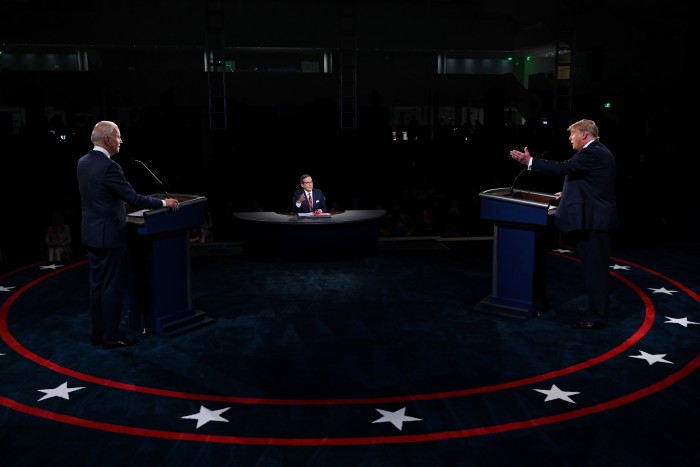
As America’s first branch of government, Congress supposedly has the power to hold the presidency to account through investigation, hearings, demanding documents and ultimately impeachment. In practice, however, that power is no longer much of a check. Trump seems to view Capitol Hill as an irritating mosquito. “Trump treats subpoenas like toilet paper,” says one senior congressional staffer. “There is almost nothing we can do about it.”
The conservative-tilted Supreme Court has not been much help. Joe Biden, Trump’s presidential opponent, was almost the sole candidate during the Democratic primary debates to say he would not pack the court by expanding its number of judges from nine to, say, 11 or 15. This would shrink conservatives to a minority. Now even Biden, an old-style traditionalist, sounds non-committal.
Last month, Ruth Bader Ginsburg, the nation’s most revered liberal justice, died from cancer aged 87. That created a vacancy that Trump immediately proposed to fill with Amy Coney Barrett, a religious conservative who, barring her gender, is Ginsburg’s opposite in almost every way. Ginsburg did more to advance women’s rights than any other figure in modern US history. Barrett, as a member of People of Praise, a charismatic Catholic organisation, belongs to a group that explicitly believes in the traditional family hierarchy with women in a subordinate role (belied, of course, by her own meteoric career).
Barrett’s near-certain confirmation opens up the prospect of a Supreme Court slanted six to three in favour of conservatives — an unassailable majority that could undo many of the gains in civil rights over the past few decades. Among these could be Roe vs Wade, the 1973 ruling that enshrined the right to abortion; Obergefell vs Hodges, the 2015 ruling that legalised gay marriage; the existence of many federal regulatory agencies (potentially including the US Federal Reserve); and the removal of remaining limits on gun ownership. A six-three court, in other words, could dramatically boost the conservative movement’s counter-revolution against post-1960s America. “This would be a court that would be far more bold about advancing Christian values — and religious ideas of how society should be ordered,” says Eric Posner, a professor at the University of Chicago Law School. It could help break already wavering liberal tolerance for the constitution.

Barrett’s nomination is overshadowed only by the presidential election. On the eve of what polls suggest could be a clear Biden victory, her confirmation by a Republican Senate would rob with the legal hand what voters look poised to bestow on Democrats with the political. As it stands, Barrett’s confirmation is likely to be hurried through the Senate the week before the election — a breathtaking move when liberals are already livid about the anti-democratic direction of America’s judiciary.
The controversy could light the fuse that ends in a full-blown crisis over America’s founding creed. “I think it’s hard to overstate how shocking this move is,” says Norman Ornstein, a leading scholar of US politics at the American Enterprise Institute. “Barrett’s confirmation would escalate the already existing nuclear arms race between liberals and conservatives. It cannot end in a good place.”
What then can be done to avert a US constitutional meltdown? The distressing answer is very little. The simplest step would be to amend the constitution to make America more democratic. But amendments require approval by three-quarters of America’s 50 states and two-thirds of each chamber of Congress — an impossibility in today’s polarised climate. Apart from a trivial amendment over congressional salaries, the last memorable one was passed in 1971, when America’s 26th amendment reduced the voting age to 18. The last serious one was the 25th amendment in 1965, which enabled a US president to be removed because of incapacity. Critics of Trump have made recitation of “25th” into something of a chant because of his alleged mental instability.
Top of any liberal wish list of future amendments would be to scrap the electoral college, which gives disproportionate sway to smaller rural conservative states, such as North Dakota, over the larger liberal ones like California. Twice in the past 20 years a US president has won election having lost the popular vote — George W Bush in 2000 and Trump in 2016. “Only once in the 44 elections between 1824 and 1996 was it clear a winning presidential candidate lost the popular vote,” says Ornstein. “Now it’s turning into a feature of the system.”
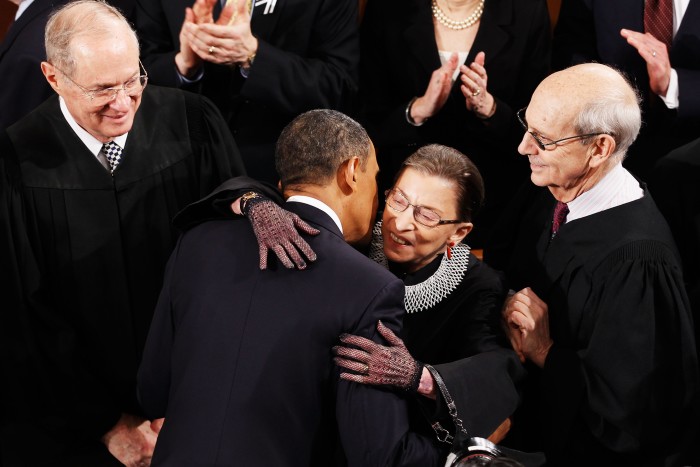
If the polls tighten in the coming two weeks, Trump could pull off that feat again. There is almost no chance of him winning the popular vote on November 3 — he trails Biden too heavily. It is possible that he could win the electoral college again. Should he contest results in any of the swing states, as Bush did in Florida in 2000, the outcome could once again be settled by conservative judges. That is what happened in Florida when the Supreme Court voted by five-four to halt the recount, effectively awarding the presidency to Bush. Should Barrett have donned her robes, that would mean a third of the court — including John Roberts, the chief justice, and Brett Kavanaugh, who joined in 2018 — had worked as legal aides on Bush’s 2000 campaign.
The spectre of another “judicial selection” to settle the US presidency has intensified efforts among constitutional apostates — a growing minority in the US’s legal faculties — to overhaul America’s founding document, or even start from scratch. One such dissenter, Sanford Levinson at the University of Texas Law School, says that the failure to change America’s constitution — either by replacing it with a document fit for the 21st century, or by doing away with a written constitution altogether — will result in one of three outcomes.
The first is the break-up of America. This year there has been a flurry of books with titles such as American Secession and Divided We Fall. The two largest putative new countries often mentioned would be Cascadia, which would include the West Coast states, notably northern California, and the mountain west, and the older idea of the Republic of Texas, which would incorporate much of the south and Midwest. “Americans are used to thinking of secession as a violent act because of the civil war,” says Levinson. “But you have plenty of examples around the world of peaceful divorce, including Scotland’s possible departure from the UK, the split of the Slovaks from the Czechs in the 1990s and Norway from Sweden in 1905.” A minor hitch is that most scholars believe the constitution forbids secession, which is why America went to war with itself over slavery.
Levinson’s second outcome is civil war. Much of the blame for America’s 1861-65 civil war came from the notorious 1857 Dred Scott ruling, which said that black Americans could not be treated as citizens even if they lived in non-slave states. Black people, including Scott, a slave who claimed he had been freed after moving from Missouri to Illinois, where slavery was illegal, “are not included, and were not intended to be included, under the word ‘citizens’ in the constitution”, wrote Roger Taney, the chief justice.
Taney was unfortunately correct. America’s founding fathers expressly denied citizenship to slaves. For the sole purpose of appeasing the thinly populated slave states, the constitution defined a slave as three-fifths of a human being, thus granting the south more congressional representation than warranted by the number of its white male citizens. Hence the reputed quip from Stokely Carmichael, the 1960s black power radical, who referred to America’s “Constitu” — he could only get three-fifths of the way through the word.
![The first page of the original copy of the US constitution from 1787. ‘Interest in the constitution is [currently] off the charts,’ says Jeffrey Rosen of the National Constitution Center in Philadelphia](https://www.ft.com/__origami/service/image/v2/images/raw/https%3A%2F%2Fd1e00ek4ebabms.cloudfront.net%2Fproduction%2Fbb9902fe-84f2-431a-8a47-85a4d36315ff.jpg?source=next-article&fit=scale-down&quality=highest&width=700&dpr=1)
Abraham Lincoln, in some ways America’s greatest founding father even though he was born years after independence, was the man who won the civil war against the south. He frequently referred to the fact that the constitution denied citizenship to slaves. Lincoln, in other words, effectively declared war on the US constitution. The Supreme Court also played a notorious role in enshrining the Jim Crow segregation of the south in its 1896 Plessy vs Ferguson ruling, which did so much to undo the results of Lincoln’s civil war victory. “Change in America has usually come from breaking the constitution rather than adhering to it — up to and including war,” says Levinson. “Not many constitutional scholars talk about that.”
Levinson’s third option, which he considers the most likely, is that America falls victim neither to secession nor to war. It simply drifts into becoming the “sick man of the west”, a 21st-century version of the once-mighty Ottoman Empire, which gradually descended during the 18th and 19th century into sclerosis. In this story, which is arguably under way, America grudgingly reconciles itself to the fact that renewal is not possible. Rather than providing a blueprint for modern reforms, its constitution acts as an ever more entrenched roadblock to change. Like the grand viziers of Istanbul, Washington’s elected and berobed elites comfortably acclimatise to a system that services their personal needs. Dynamism unconsciously morphs into stasis. A country that prided itself on its political radicalism turns inwards into a form of ancestor-worship known as “originalism” — the legal doctrine that the country’s limits are defined by the words of America’s founding fathers or the intended meaning behind their words.
“Originalism is a bit like the Protestant Reformation,” says Eric Posner. “You have to go back to the original text and read it literally.” In reality, Posner adds, originalists simply read whatever they like into the constitution. A historical reading of America’s first amendment, which guarantees free speech, would tell you that it was explicitly meant to prevent the government from closing down subversive publications in feverish 1790s America. Somehow that text has been reread into a right for corporations to spend unlimited money on elections.
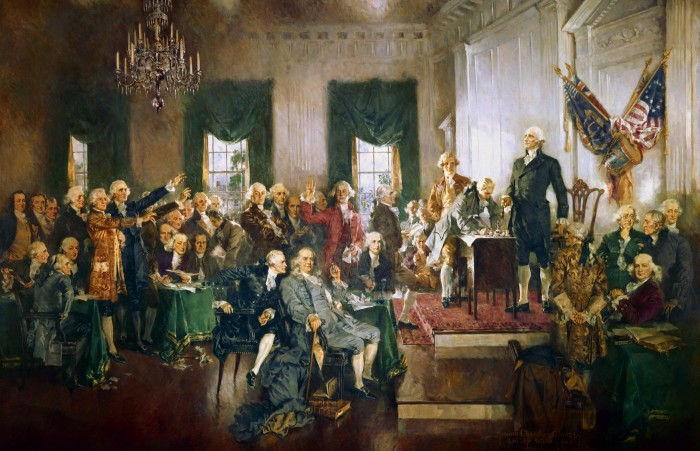
Likewise, a contextual understanding of the second amendment, which enshrines the right to bear arms, makes it clear that its 1790s drafters meant organised militias. Again, originalists have extracted radically different interpretations. Now the second amendment is taken to mean that Americans can carry concealed arms into shopping malls and churches, or keep small armouries designed for the battlefield in their basement. Neither interpretation of either amendment was mainstream half a century ago. Yet it is as hard today, as then, to read the actual words and match the interpretations of the originalists. “In some respects, originalism is just a fig leaf for making up what you want to make up, just like you can find whatever you like from the Bible,” says Posner. “Originalism is a licence to be creative.”
Among many others, Barrett is a devotee of originalism. Her mentor, Antonin Scalia, who served on the Supreme Court for three decades, was the jurist who did most to advance the doctrine, which is sometimes called “textualism”. Almost none of the challenges America faces — global warming, becoming a minority-majority society, producing vaccines at speed, high-tech competition with China — could have been foreseen by the founding fathers.
It was precisely in anticipation of the unforeseeable that Thomas Jefferson, the most poetic of America’s founders, recommended the US change its constitution every generation. “As my colleague Mike Seidman once put it, imagine you are sitting in a room and you’re trying to figure out how to solve some 21st-century challenge we face,” says Brooks. “Then someone bursts in and says, ‘Hey, I’ve got the answer. I’ve found this document written in the late-18th century when America only had four million people, most of whom were farmers.’ Do you really think they would have a clue?”
In the immediate future, the country faces two radically divergent forks. The first is a slow-burn constitutional crisis, which begins with a Biden victory. Even if he defeats Trump by a landslide, Biden’s plans would run into almost immediate judicial difficulties. One of these would be a heavily conservative Supreme Court that is likely at some point to strike down the “individual mandate” that obliges everyone to buy health insurance under Obamacare. Indeed, the Supreme Court is due to hear a challenge to Obamacare the week after the election. No vaguely affordable US public healthcare coverage could work without compulsory insurance.
Biden would also face a Senate that could block his legislation, as it did for the last six out of eight years of Barack Obama’s presidency. Even if the Democrats regained control of the Senate by winning more than 50 seats next month, Biden would still need a filibuster-proof supermajority of 60 to pass serious legislation. There are usually a few Democrats who switch to join Republicans on key votes, often including Joe Manchin of West Virginia and California’s Dianne Feinstein.

Running instantly into these red lights would present Biden with several temptations, all of which are technically legal. These would include abolishing the Senate filibuster so that bills could be passed by a simple 51 majority. It could also entail “packing the states” by awarding statehood to the District of Columbia, Puerto Rico and possibly the American Virgin Islands. Since each state gets two senators regardless of population, that would add six reliably Democratic seats to Biden’s column.
Democrats could also “pack the court”, either by expanding the size of the Supreme Court and filling the newly minted robes with reliably liberal justices or by imposing term limits on sitting justices. At the moment, Supreme Court justices can serve for life. At 48, Barrett could be shaping America’s future for the next 40 years. Nowhere in the US constitution does it specify the Supreme Court should consist of nine judges. Before the civil war, its size fluctuated between six and 10.
Though Biden is temperamentally wedded to tradition, reality may force him to act radically. Even Obama, who barely mentioned constitutional reform when he was president, now supports abolition of the Senate filibuster. Conservatives would naturally be appalled at any one of these changes, let alone all three. “All of these changes supported by the left are supposed to make America more democratic,” says John Yoo, a professor of law at Berkeley who was a close ally of Dick Cheney, the former vice-president. “They overlook the fact that America was designed to be a republic, not a democracy. By design, change is hard to bring about. The founders deliberately built in protections against the tyranny of the majority.”
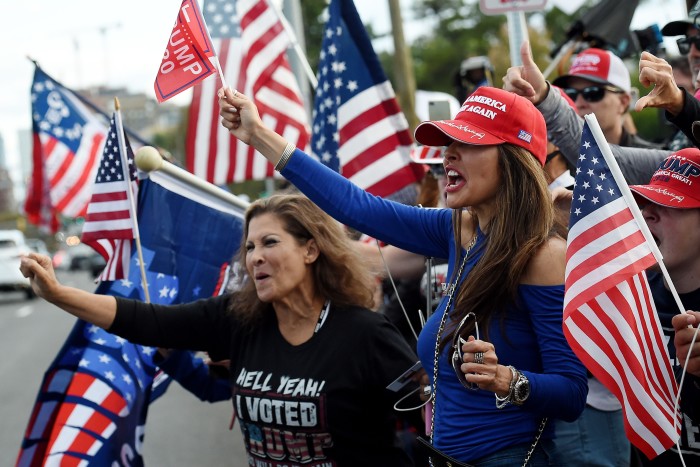

Yoo adds an ingenious argument from the conservative point of view. “Brexit would not have been possible with the US constitution,” he says. “America’s system prevents sweeping changes with 51 per cent of the population.” Under the US constitution, of course, Britain would have been prevented from joining the EU in the first place. Earlier this month, Mike Lee, a Republican senator from Utah, said it even more baldly: “We’re not a democracy. The word ‘democracy’ appears nowhere in the constitution.” Like Chief Justice Taney’s view of slaves in 1857, Lee was correct. If the founding fathers were wrong about slavery, and indeed about women (who were also denied the franchise), might they also have been wrong about democracy?
Other conservatives view the left’s agitation against the system as un-American — a serious charge in a country where traditionally it is adherence to creed, rather than ancestry, that qualifies you for membership. “The essence of the problem is that liberals hate the constitution and conservatives revere it,” says Richard Porter, a leading corporate lawyer, who also serves on the Republican National Committee. “If you start packing the Supreme Court with your own people, then you will turn it into a super-legislature rather than a body that upholds the rule of law. What would be the difference then between America and Venezuela?” Change should be hard, adds Porter. The Senate was meant, in George Washington’s words, to play saucer to the House of Representatives’ hot tea. It was where public passions would cool off.
It might be a little unfair, however, to compare Joe Biden with Venezuela’s president Nicolás Maduro, or Viktor Orbán, Hungary’s leader, who has also bent his country’s judiciary to his will. The Democratic hope would be to align the judicial system with US majority opinion on issues such as healthcare, abortion, environmental regulation and gun control — or at least to dilute the Supreme Court’s veto over the actions of elected officials. “Clear and settled majorities of Americans support these reforms, yet somehow the system keeps frustrating their will,” says Aziz Huq at the University of Chicago Law School. Orbán’s express aim, meanwhile, has been to create an “illiberal democracy”, which bears an uncanny resemblance to authoritarianism.

A better parallel comes from American history — Franklin Delano Roosevelt’s infamous 1937 effort to pack the courts. His attempt to expand the US Supreme Court came after it had struck down most of the key pieces of the New Deal in his first term. He was elected amid the Great Depression. In 1933, he inherited a strongly conservative Supreme Court — dubbed “nine old men in kimonos”. The year before FDR was elected, 100,000 Americans applied for jobs in the Soviet Union. History records that Roosevelt’s scheme backfired. The bill foundered. Yet from then on, the Supreme Court dramatically changed its stance. Its nine justices ceased to strike down New Deal legislation. “The switch in time that saved nine,” as the saying went.
If that episode carries any resonance, Biden could chasten today’s Supreme Court simply by threatening to pack it. Joseph Stalin, the Soviet dictator, once asked, “How many divisions does the Pope have?” after Winston Churchill advised him to take heed of the Vatican’s views. Like the Vatican, the power of America’s Supreme Court ultimately rests on its moral legitimacy.
The second fork in the road is an explosive constitutional crisis triggered by a contested election outcome next month. Last year, Rosa Brooks set up a group called the Transition Integrity Project that carried out “war games” exercises about possible outcomes to a disputed election. One such scenario involves Trump winning the electoral college while losing the popular vote to Biden by 52-47 per cent. The election takes place amid a low turnout because of voter suppression — the closure of polling stations in urban minority precincts, for example — and Covid-19 fears prevent others from turning up to vote in person. The outcome quickly degenerates into an impasse in which, it turns out, Trump holds almost all the cards.

Uniquely to the US, the country’s constitution keeps the incumbent in power for a full 11 weeks between election day and the inauguration of the next president. Like so much else in any constitutional democracy, the system ultimately survives because of behavioural codes rather than law. Rules are a confidence trick. If enough people refuse to follow them, they cannot be enforced. “The great secret about the US constitution is that it relies on public acceptance,” says Huq. “Without legitimacy, nothing can last for long.”
In contrast to, say, Jimmy Carter in 1980 or George HW Bush in 1992, Trump shows no signs of abiding by an antiquated honour system that says the incumbent should respect the rules of the game. In Brooks’s range of scenarios, only one — a Biden landslide — does not lead to American conflagration. Though the exercises included liberals and conservatives (and also myself), Brooks has been accused in the Trumpian media of plotting a “Democratic coup”, which has led to a torrent of menacing emails.
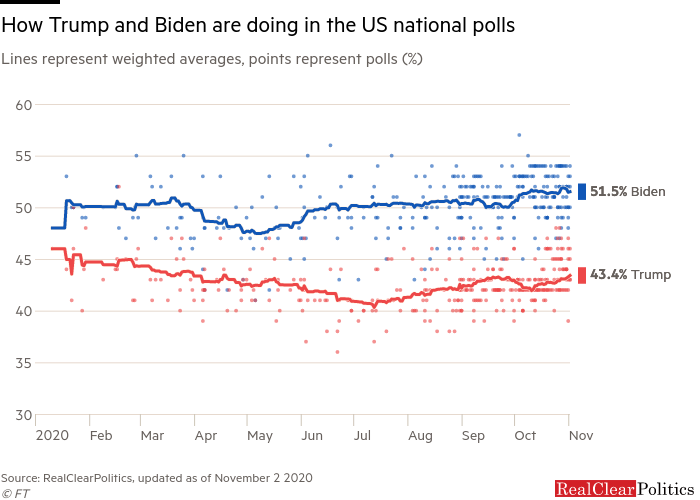
Such threats are nothing new for public figures in today’s America. I know of one Washington-based journalist who has temporarily had to move their family into a hotel on the advice of the FBI. Last week, the FBI uncovered an advanced plot by members of a rightwing militia to kidnap Gretchen Whitmer, Michigan’s Democratic governor. “This is probably the most polarised American climate since the build-up to 1860,” says Preet Bharara, a former Democratic US attorney for the southern district of New York. “My bet is the system will survive intact. But if Trump contests next month’s election, I might change my mind.”

Trump’s broader pandemic record, and the operatic way in which he responded to his own Covid-19 diagnosis, has lessened the spectre of such a breakdown. Biden’s poll lead has edged closer to double digits. The chances are that this dog will not bark — or at least not yet. Even if America descends into street hostilities next month, the odds are the Supreme Court would not want to stick its head above the parapet. “I would be hugely surprised if the Supreme Court would take such a risk with its legitimacy,” says Jeffrey Rosen, head of the National Constitution Center in Philadelphia, the city where the founding fathers hammered out the document. “They would not want to jeopardise their position.” Rosen points out that traffic to his centre has skyrocketed in the past year — the NCC is now the third most-visited museum website in America. This reflects the country’s heightened awareness over what is at stake. “Interest in the constitution is off the charts,” Rosen says.
Let’s suppose that the likelier outcome next month is a Biden victory — and a slow-burn US constitutional crisis, rather than imminent breakdown. For how long can it slowly burn before it flares? “If the system is the same in 2030 as it is now, America will start to fall apart,” says Ornstein. He points out that within 20 years, 30 per cent of the US will elect 70 of its 100 senators. Levinson adds: “The US Senate is an affirmative-action programme for white, rural, Christian conservatives, who have an increasingly powerful veto over America.” Posner says: “We are likely to see a judicial expansion of religious restrictions dressed up as freedom in the language of originalism.” Brooks says: “Are we, as a country, able to debate whether we can change our furniture? Or has our constitution become a secular religion — too sacralised even to go there? History should teach us that nothing lasts for ever.”
Swamp notes

In the countdown to the 2020 election, stay on top of the big campaign issues with our newsletter on US power and politics with columnists Rana Foroohar and Edward Luce. Sign up here
It could be, as Levinson suggests, that America — and Washington in particular — will simply accommodate itself, Ottoman-style, to tenured stagnation but without the seraglios. It is probably worth heeding a historical warning from Kemal Atatürk, the Turkish nationalist who delivered the death blow in 1922 to the long era of the Ottoman sultans. “The evils which had sapped the nation’s strength had all been wrought in the name of religion,” Atatürk said. Or, to paraphrase distilled wisdom from almost any civilisation, whether it be in the Levant or North America, and all points east and west: “If things cannot bend, eventually they will break.” Is America capable of bending?
Edward Luce is the FT’s US national editor
Follow @FTMag on Twitter to find out about our latest stories first. Listen to our podcast, Culture Call, where FT editors and special guests discuss life and art in the time of coronavirus. Subscribe on Apple, Spotify, or wherever you listen
The article has been amended to correct the line on Franklin Delano Roosevelt’s Supreme Court make-up. It is “The switch in time that saved nine” rather than “The stitch in time that saved nine”
Letters in response to this article:
Dollar collapse would seal America’s calamitous fate / From Chris Kniel, Orinda, CA, US
‘Switch’ in time reflected judge’s change of view / From Donald WF Conkey, Washington, DC, US
Amendments are the US constitution’s safety valve / From Ernest Chambers, Los Angeles, CA, US

Comments